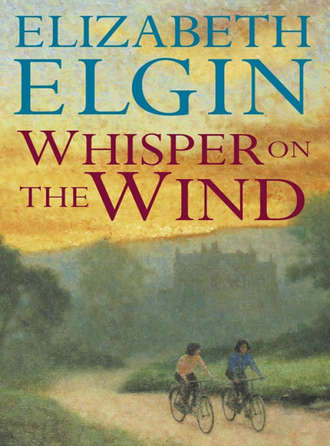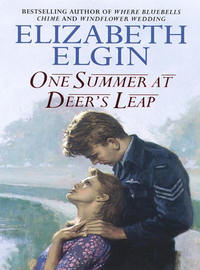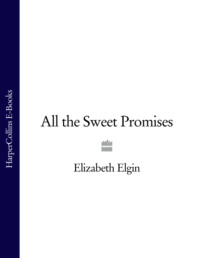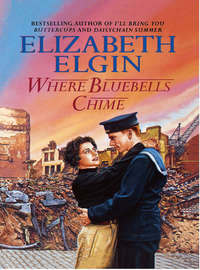
Полная версия
Whisper on the Wind
‘And what in the name of goodness was all that about?’ Polly Appleby put down the brown paper carrier-bag which held polishing cloths, pinafore and slippers. ‘Rush, rush, rush, that one. Never a minute to spare. Where’s she off to now?’
‘The letter came.’
‘Oh, aye? It’s all right, then?’
‘It’s all right. They’re not going to call her up.’
‘Never thought they would.’ Polly filled the kettle and set it on the stove top. ‘Stands to reason, don’t it? I suppose she’s away to tell Jonty Ramsden?’
‘To tell Mat, actually. It’s good of Mat to help out with the ploughing and such-like. He hasn’t got the time, really, and he certainly doesn’t have the men. He’s got his own farm to run and there’s only Jonty to help him.’
‘There’s Grace. Works like a man, Grace Ramsden does. And Mat Ramsden’ll do all right out of your parkland – or so talk has it.’ She held her hands to the fire. ‘But you’ll not be interested in village talk.’
Only Polly spoke to Hester Fairchild as an equal. Polly had always been there; had been a housemaid at Ridings when Hester Fairchild came there as a bride, all those years ago.
She stooped to throw a log on the fire, sending white ash falling into the hearth, and red sparks darting up the chimney.
‘My, but that’s a frosty fire, ma’am. Be a cold ‘un tonight.’
‘The village?’ Hester took cups and saucers from the dresser. ‘What are they saying now?’
‘Well, talk has it that Mat Ramsden has asked the War Ag. for a landgirl. All Alderby knows. If he’s to go into partnership with you, they reckon he’s going to need all the help he can get.’
‘Alderby seems well informed, as usual,’ Hester observed. ‘And it won’t be a partnership, exactly. But I’m told I must plough up my parkland and grow food on it, and since my acres are next to his, it seems sensible to work them between us as best we can.
‘That’s why Roz applied for exemption. She might as well work on her own land as join the Land Army and work on someone else’s. I was beginning to think they wouldn’t allow it. It seemed such a straightforward solution that I was certain they’d tell her she had to join up, or go into munitions, or something.’
‘Hmm.’ Polly laid traycloth and cups on the silver-handled tray for, war or no war, even a cup of tea was taken in a civilized manner at Ridings. ‘And there’s talk that the War Ag. is paying farmers well for putting grazing land under the plough. Two pounds an acre subsidy, I heard tell they’d get. That’ll be more than four hundred pounds, won’t it?’
‘Four hundred and eighty.’ The information was tersely given. ‘There are two hundred and forty acres, to be exact.’ Drat the village for its nosiness and drat it again for being right for once. ‘And one landgirl won’t be enough, Mat told me. He’ll need Roz, too, and a good ploughman. Oh, there’ll be enough for the girls to do; just for them to take over the milk-round will be a load off Grace Ramsden’s mind.
‘But my land must be ploughed up, and soon. Those acres have been down to grass since ever I can remember and the sooner they’re opened up to the weather the better.’
‘I’ll grant you that, but a good ploughman is as rare as hen’s teeth these days,’ Polly brooded. Stood to reason, didn’t it? There’d been little money in farming between the wars and small use growing crops that nobody wanted to buy. Ploughs had lain rusting these last twenty years; ploughmen had abandoned their skills and gone to the towns.
‘I know that, Polly, but we’ll manage between us. We’ll have to. If that parkland isn’t under cultivation by March, the War Ag. will take it over for the duration. It’s as simple as that.’
‘But they can’t do that, ma’am. Isn’t theirs to take!’
‘They can, and they will. The War Ag. can take my land just as any government department can take anything it wants. They’d fling the Defence of the Realm Act at me and if I protested I’d be unpatriotic.’
‘And lose your land, whether or no.’
‘Exactly. So let’s hope Mat gets his ploughman and his landgirl.’
‘Aye.’ Polly settled herself in the fireside rocker, stirring her tea, gazing into the hearth. Just the one fire burning here, now, yet when she’d been a young under-housemaid here, she could have counted five fires at least burning from morning till night, and fires in the bedrooms, too. But coal was a pound a ton then, and logs for the taking from the estate. And the Master had been alive and Miss Roz’s mother a slip of a girl.
Ridings had been the place to work at the turn of the century, Polly considered. Far better than being in service at Peddlesbury, ugly old Victorian pile that it had been. Built on wool and inherited coal money and them as lived there then not real gentry, like the Fairchilds. Now Peddlesbury was an aerodrome and Ridings not the house it used to be.
But things had been different before the Master was killed. And before that fire. Twenty-four bedrooms there’d once been and three housemaids and a cook and scullery-maid and a footman. Aye, and a parlourmaid and a housekeeper as well as the outside staff.
But that was another life it seemed, and now she, Polly, lived in one of the gate lodges and came each day to ‘do’. She had been a part of a life that was long gone and because she still remembered the Master and Miss Janet, she was as much a part of Ridings as the woman who owned it and the granddaughter who would one day inherit it, and the worry of it.
‘You’re quiet all of a sudden. Penny for them?’
‘Oh, they’m worth more than a penny,’ Polly returned gravely. ‘Oh my word, yes. A lot more than that.’
‘Then I’d best not ask. But sometimes, Polly, I wonder. Have I been wise, urging this exemption on Rosalind? Often, I think she spends too much time with me. Might it not have been better if I hadn’t tried so hard to keep her here – if she’d been left free to join the forces, seen a bit of life outside Alderby St Mary?’
‘It might have been, but like you said, she just might have opted to join the Land Army and been sent to work on some other farm.’
‘I know. But what do you mean, some other farm? I don’t have a farm, Poll Appleby.’
‘You don’t? Then what would you call all those acres you’ve got to cultivate? Seems to me that whether you like it or not you’re up to the neck in farming for the duration, and so is Miss Roz. And she’s as well staying at home and looking after her inheritance as she is joining the Air Force or the Army.’
‘Inheritance? A few hundred acres of parkland and all that remains of a house? And the parkland will go back to grass when the war is over and be left idle again. Some inheritance! And it’s all I have to leave her. That, and her name,’ she whispered bitterly.
‘Now don’t get yourself upset, ma’am. I know it’s the time of year, but soon it’ll be Christmas and afore you know it there’ll be a new year to look forward to.’
The time of year. December, when everything awful happened, Hester brooded. They’d taken Martin from her in December and it had been December when Ridings caught fire, the lanes so blocked with snow that the horses pulling the fire engine made heavy going and arrived almost too late.
And did it have to be December when Janet and Toby drove up to Scotland, leaving a two-year-old child behind them at Ridings and never coming back for her?
‘Yes, Polly, it’ll soon be over. And take no notice of me. I’m just a silly old woman.’
‘Old? You? Nay, I’ll not have that.’
The Mistress was sixty-four, Polly knew that as fact. She looked nowhere near her age, with those great brown eyes and hardly a line on the whole of her face. A beautiful woman, holding back time; still waiting for her man to come home, and find her unchanged. To Polly, she was still the laughing young girl who came to Ridings all those years ago on Martin Fairchild’s arm. And she would always be a fitting mistress for Ridings, no matter how life had treated her.
Thank God for the man from the War Ag. because now Ridings would be earning its keep again – the Mistress would have a pound or two in her pocket and not have to worry about keeping body and soul together, counting every penny and every lump of coal she put on the fire. Hester Fairchild had kept her pride and reared Miss Janet’s little lass to be a credit to the place. High time she had a bit of luck. Heaven only knew she deserved some.
Sniffing, Polly placed her cup on the draining board. ‘Ah, well. Best be making a start. What’ll it be today, then? Bedrooms or bathroom and stairs?’
The sky was ice-blue, the earth hard underfoot, the grass white and crisp with hoar frost. There was no sun, but the sky shone with a strange, metallic brightness and Roz knew that tonight it would be bitterly cold again. Tonight, the bombers at Peddlesbury would remain grounded.
‘I’m back!’ she called, slamming shut the door, hurrying to the fire. ‘My, but it’s cold. No sign of a let-up. It’ll freeze hard again tonight, just see if it doesn’t. I don’t suppose there’s a cup of tea in the pot?’
There was. Almost always. Tea was rationed, so the pot was kept warm and used until the leaves inside it would take no more diluting.
‘What did Mat say?’ Hester poured boiling water into the pot. ‘Was he pleased?’
‘Mat wasn’t there. He’s gone to the Labour Exchange again to nag them some more about a farm man, and Jonty’s gone to York for spares for the tractor. Grace said he wants to make a start on our ploughing as soon as the frost lets up a bit. It’s going to be one heck of a job, you know.
‘And good news – they’re getting a landgirl very soon. She might even be there tomorrow. Grace said that since I know everybody in the village, it might be a good idea for me and the new girl to take over the milk-round.
‘So don’t worry too much, Gran love. We’ll have Ridings parkland earning its keep before so very much longer. Think I’d better pop upstairs and tell Polly about the letter …’
‘Polly knows, so don’t keep her talking!’ Hester called to the retreating back. Then her lips formed an indulgent smile, because it seemed that her granddaughter was right. Between them they would make those long-idle acres grow food and earn money. Roz didn’t have to go away and December would soon be over. There’d be another year to look forward to; another spring.
‘Thank you, Janet,’ she whispered, eyes closed, ‘for giving me this lovely child …’
Roz walked around the bed Polly was making and picked up a corner of the sheet. ‘You know about the letter, Poll?’
‘Aye. Charity begins at home.’
‘Hmm. Jonty’s making a start on Gran’s ploughing very soon and Mat’s been allocated a landgirl at last, so it’s all going to work out, isn’t it? We’ll make it by March, if the frost breaks soon. Bet it’s terrible on the Russian front. They say it’s the coldest December for nearly twenty years.’ She abandoned the bed-making to wander over to the dressing-table mirror. ‘It’s freeeeezing outside. Just look at my nose. Red as my hair, isn’t it?’ Frowning, she turned away. ‘I’m not a bit like Gran, am I, Poll? Come to think of it, I’m not really like anybody. Where do you suppose my colouring came from?’
‘Colouring? With hair like yours, you’re complaining?’
‘No. Just curious. Gran is dark and so was Grandpa. And my parents were dark-haired and dark-eyed, so who sneaked in my carrot top?’
‘Auburn.’ Carrot top, indeed!
‘Auburn, then. But where did it come from?’ Not from anyone in any of the portraits, that was certain. All the way up the stairs and on the landing and in the downstairs rooms, not one of the Fairchilds hanging there had red hair. ‘Where, will you tell me?’
‘Gracious, child, how should I know? From your father’s side, perhaps, or maybe you’m a bit of a throwback? Yes, come to think of it, there was one with red hair, I seem to remember. Her portrait got burned, though, in the fire.’
‘Yes, of course.’ Roz didn’t remember, but best not talk about the fire, especially in December, that bleakest of months. ‘I suppose it makes a change – my being green-eyed, I mean, and red-haired.’
‘Suppose it does. Wouldn’t do if we all looked alike, would it? Now are you going to give me a hand with this bed, or are you going to stand there staring into that mirror till it’s done?’
‘It isn’t going to be a barrel of laughs, Poll, my being in a reserved occupation.’ Roz straightened the fat, pink eiderdown. ‘People look at you when you’re young and not in uniform, you know. Jonty’s had all sorts slung at him.’
‘Then I’m sure I don’t know why.’ Polly sniffed. ‘Jonty is doing a good job for the war effort and so will you be. Growing food is important, or why did they make you reserved?’
‘Yes, but when you’re as young as Jonty and me, people just expect you to be in uniform. He’s taken quite a bit of stick about it. “Get some in!” someone yelled after him. “Why aren’t you in khaki, mate? A bloody conchie, are you?”, though I know he’d rather have been a pilot, or a Commando.’
‘They’d never take Jonty Ramsden for a pilot nor a Commando,’ Polly retorted, matter-of-factly. ‘When did you ever see a pilot or a Commando wearing spectacles? Jonty will survive such talk and so will you, though it’s sad people should say things like that.’
If Martin Fairchild had been in a reserved occupation in the last war, he’d have been alive today, the older woman brooded. Uniforms were all very well, were fine and smart and patriotic, but they got you killed. The Mistress wouldn’t have minded the taunts. And now it was happening again. The war to end all wars, they said that one had been, yet only twenty years on …
Sad for the young ones, really. This war was none of their making, yet it was young shoulders the burden had fallen on, Polly sighed silently, and so many of them would never see the end of it. The Master hadn’t, nor her own young man. But that war was history, now. Their war had been glorified slaughter and because of that she was glad Miss Roz was staying at home with her gran; glad she would never join the armed forces, nor wear a uniform. And if thinking that was unpatriotic, then she didn’t give a damn, Polly thought, defiantly. Roz was all the Mistress had left. It was as simple as that.
Now the daft young thing was nattering on about her hair again, and that they could do without. Mind, it came up from time to time and was dealt with by her grandmother. But Roz ought to be told, Polly scowled, picking up dustpan and brush. She’d said as much, not all that long ago.
‘Don’t you think Miss Roz is old enough to know about –’ she’d said.
‘About what?’ the Mistress had interrupted, off-hand. ‘That she’s a Fairchild? But she knows that, Polly. She’s always known it. What more is there to tell?’
What more indeed? The Mistress had probably been right. And even if she wasn’t, she had her reasons for acting as she did.
‘She’ll hear nothing from me.’
‘Of course she won’t, Poll Appleby. There’s nothing to tell,’ Hester Fairchild replied briskly. Then her face had taken on that long-ago look. ‘Polly, if suddenly I weren’t here –’
‘Oh, aye? And where, suddenly, are you going, then?’
‘You know what I mean! I’m talking about the war; about nobody being certain of anything any more, and you know it. If suddenly I weren’t here, Poll, then it would be up to you. Because you’re the only one who knows, apart from me; the only one I’d trust to tell her. But only if she really needed to know, you understand?’
‘Aye, ma’am. Only if,’ she’d said, and the matter had been dropped for all time. Or so they had thought.
Oh, drat that lass and the colour of her hair! Why did she have to go on about it? Why on earth couldn’t she leave well alone?
‘Marvellous!’ Kathleen Allen heaved her suitcase from the bus stop opposite, glad to reach the shelter of the railway station again. ‘Flipping rotten marvellous!’
To think she might now be sitting beside the fire at home, her feet snug in Aunt Min’s hand-knitted slippers, a cup of tea at her side. But she stood instead in a blacked-out, unknown city and the next bus to Alderby St Mary not due for two more hours.
But it was her own fault. She should have heeded her husband’s warning and found war work in a factory or office; anywhere but in the Land Army. Dejectedly she sat down on her suitcase. The journey to York had been a nightmare. She had missed her connection at Crewe, though she strongly suspected there had been no connection to miss, then, after giving right of way to a goods train, a troop train and a train carrying ammunition, they at last pulled out of the station almost two hours late.
You were right, Barney. I should have listened to you. And do you know something else? I’m so cold and hungry that I’d sell my soul for a cup of tea!
She wasn’t crying, she really wasn’t. It was just that it was so cold and draughty sitting here in a gloomy, grimy station that her eyes were watering, and –
‘Hi, mate! Anything the matter?’ A Waaf corporal in trousers and battle-dress top stood there, smiling. ‘Would one of these help?’ She reached into her pocket for cigarettes. ‘Go on, it’s all right.’
‘No! I shouldn’t.’ Cigarettes were hard to come by. It wasn’t fair to take other people’s, be what they called an OP smoker, ‘I’m all right, thanks. Just a smut in my eye …’
‘I know the feeling well, but it passes, it really does.’ The girl in airforce blue took two cigarettes from the packet, then struck a match. ‘You wouldn’t be looking for a lift?’
‘A lift? Oh, aren’t I just.’ Kath inhaled blissfully. ‘But I don’t suppose you’re going my way. Not to Alderby St Mary?’
‘I can do better than that.’ The corporal laughed, ‘I go right past Peacock Hey, and I’ll bet a week’s pay that’s where you’re going.’
‘But I am! I am!’
‘Then just wait till that lot have unloaded their kit.’ She jerked her head in the direction of the airmen who jumped down from the back of the truck. ‘They’re going on leave, the lucky dogs. Home for Christmas. Makes you sick, don’t it?’
‘Sick. Yes.’ Kath drew deeply on her cigarette, then held the lighted end in the cup of her hand, just as she had seen Barney do; just as the corporal did now. Come to think of it, it was the way cigarettes were always held after dark, for didn’t they say that even the minutest glow could be seen from an enemy plane, though she very much doubted it. The real reason for cupping a cigarette, she supposed, was to hide it, for smoking outdoors in uniform was forbidden. Wasn’t it wonderful that she, Kath Allen, was in uniform now and being called mate by an Air Force driver? Mate. It sent a great glow of belonging washing over her and Barney’s expected disapproval was suddenly forgotten. She was a landgirl, wasn’t she? Still cold and hungry of course, but she was going to live in the country and work on a farm. Before long she would be at Peacock Hey and with luck there’d be a sandwich and a cup of tea there, maybe even hot water for a bath.
‘Thanks.’ She smiled at the Waaf corporal. ‘Thanks a lot – mate.’
They drove carefully. The streets of York hadn’t been laid down with RAF trucks in mind, the corporal said, and there were blacked-out traffic lights which could hardly be seen.
‘Isn’t it amazing,’ Kath murmured when the city was behind them, ‘you knowing about Peacock Hey, I mean.’
‘Not really. The girls there go to the Friday-night dances at our place and sometimes, if I’m on late duty like now, I take the truck and collect them.’
‘Your place?’
‘RAF Peddlesbury. There’s a big old house on the very edge of the runway called Peddlesbury Manor; it’s the Ops Centre and the Mess, now, and some of the unmarried officers sleep there, too. I believe Peacock Hey was once owned by the manor; I think the bailiff lived there. The Peacock girls are a decent crowd. It’s your first billet, isn’t it?’
‘Yes, and I’m looking forward to it. I’ve never lived in the country, you see – come from Birmingham …’
‘Well, one thing’s certain. It’s a whole lot quieter round these parts than Birmingham – or London, where I come from. Not a lot of bombing here, but we get quite a few nuisance raids. On the whole, though, you can expect to get a good night’s sleep. Has anyone told you where you’ll be working?’
‘Haven’t a clue. Hope it isn’t a dairy farm. Couldn’t milk a cow to save my life.’
‘You’ll learn, mate.’ The girl at the wheel grinned. ‘When I joined this mob I’d never been in charge of anything more lethal than a push-bike and look at me now, driving this truck.’
Kath sat contented in the darkness of the cab, peering into the rolling blackness as if she were riding shotgun. She wished she didn’t feel so smug, so defiant almost, because at this moment she didn’t care what Barney’s next letter might bring. For just once she was doing what she wanted to do and it was heady stuff. When the war was over and Barney came home, she would be a devoted wife, keep his home clean and always have his meals ready on time. But for now, for the duration, she would enjoy every minute of being a landgirl and living in the country. If the corporal could learn to drive a truck, then Kathleen Allen could learn to milk a cow and maybe even drive a tractor. She let go a sigh of pure bliss.
‘Tired?’
‘No. Just glad I’m almost there.’ Kath smiled.
‘Not almost. This is it.’ Gently they came to a stop. ‘Careful how you get down.’
‘This is the hostel?’
‘Across the road, beside that clump of trees. Mind how you go. See you around.’ The engine started with a roar.
‘See you. And thanks a lot, mate!’
The front gate of Peacock Hey had been painted white and the stones, too, that lined the path to the front door. Kath walked carefully, feeling for the doorstep with the toe of her shoe. She couldn’t find a bellpush, so knocked loudly instead, waiting apprehensively.
From inside came the swish of a curtain being pulled, then the door opened wide.
‘Where on earth have you been, girl? We expected you before supper. It’s Kathleen Allen, isn’t it?’
‘That’s me. Sorry I’m late. The –’
‘Oh, away with your bother.’ The tall, slender woman drew the blackout curtain over the door again then switched on the light. ‘Trains bad, I suppose?’
‘Awful. I got a lift, though, from York.’ She looked around at the linoleum-covered floor and stairs, at the row of coat pegs and the letterboard beside the telephone. It reminded her of the orphanage, yet her welcome here had been warm, and there was a vase of yellow and bronze chrysanthemums in the stair alcove. The flowers comforted her, assured her it would be all right. She had a theory about houses – they liked you or they didn’t. Either way it showed, and Peacock Hey liked her.
‘I don’t suppose there’d be a cup of tea?’ she asked, nervously.
‘There would, lassie, but let’s get your case upstairs, then you can come down to the kitchen and have a bite. Cook lives locally and she’s away home, but she left you something and I’ve been keeping it hot in the bottom of the oven.
‘Afraid you’re in the attic – oh, I’m Flora Lyle by the way. I’m your Forewoman.’ She held out her hand and her grip was warm and firm. ‘I hope you don’t mind being shoved up here? It’s cold in winter and hot in summer, but it’ll only be until someone leaves and there’s bedspace for you in one of the rooms. We shouldn’t really use the attics – fire-bomb risk, you know, but I don’t suppose there’ll be any, and there’s sand and water up there, just in case. And you will have a room to yourself,’ she added, as if by way of compensation. ‘It’s just that we’re so crowded …’
‘It looks just fine to me.’ Kath set down her case and gazed around the small, low-ceilinged room, saw a black-painted iron bed, mattress rolled, blankets folded, a window hung with blackout curtains in the gable-end wall. Stark, it was, like the orphanage; bare like her room had been in service.
‘Your cupboard is outside on the landing, I’m afraid.’
‘It doesn’t matter. It really doesn’t.’ A chest of drawers stood beneath the sloping ceiling, a chair beside the bed. ‘It’s fine, truly.’







